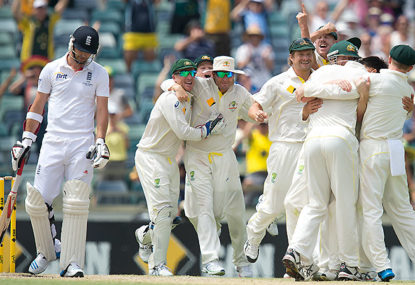As Michael Clarke snared the catch that sealed a 5-0 Ashes whitewash, and the Australians celebrated like only Australians can, there was precious little to discuss that hadn’t already been talked about at great length.
From England’s poor overall series, and individual narratives including Alastair Cook’s captaincy and Kevin Pietersen’s malaise, to the other side of the coin, with the fantastic cricket that Australia – on the most part – played, it has all been dissected by fans and experts alike.
However, with some pundits quickly shifting their focus to the upcoming South African tour – and what will surely be a sterner task for the Australian Test team – the make-up of the touring squad, and in particular the starting XI, began to be a topic worthy of conversation.
Australia maintained the exact same eleven players across the five Test Ashes series, finally providing the stability the team, coach Darren Lehmann and fans had all longed for.
As with any continuity in selections, the fact the team was winning made loyalty easier for the national selectors.
Or did the stability enable the success?
Cricket’s version of the ‘chicken and the egg’ is an interesting question, and brings me to the point of this piece: should a winning team really make any changes to its line-up?
My personal opinion is – and in true Ryan-style, I’ve argued with myself about this – changes shouldn’t be made to a cricket side that is winning.
The objective of a cricket team, and thereby its selectors, is to win. If that objective is achieved, why would you want to mess with what is obviously a successful formula?
I appreciate the notion that if a team can be improved, you should do it. That makes logical sense, and if you can strengthen an already strong team, there is an argument that says you’re helping to ensure you actually keep winning, instead of getting complacent or carrying underperforming players.
Yet I would counter with the point that by changing a winning team, you’re gambling that said changes – and the unknown that comes with it – will improve something that’s already working.
Shane Watson and George Bailey are realistically the only Australian players that have their positions in the team in any doubt.
The bowling unit was sensational, worked in partnerships extremely well, and totally dominated the English batting line-up. There will be no changes to that quartet, nor should there be.
Meanwhile, Chris Rogers, Dave Warner, Michael Clarke and Steve Smith all averaged over 40 for the series, with two hundreds each. I don’t think any of their spots were in jeopardy, but they certainly aren’t now.
Wicketkeeper Brad Haddin was actually my man-of-the-series and, needless to say, his place in the team is certainly not under any threat.
Which brings us back to Watson and Bailey.
I don’t think Watson is in any danger whatsoever of being dropped. He averaged a tick under 40 runs, and took some crucial wickets. That’s exactly what you want from your all-rounder.
Though Watson will always be a polarising player, he’ll be on the plane to South Africa, though what might come into question is his spot in the batting line-up.
George Bailey, on the other hand, is under pressure. He averaged just 26.14 runs, with one half century; numbers that are less than satisfactory for a top six batsman.
Unfortunately for Bailey, unlike in recent times, there actually appears to be some legitimate options for any potential opening in the Australian Test batting line-up.
Tasmanian Alex Doolan is clearly rated by the selectors, as he was named in the squad for Sydney Test, and then stayed on with the team after Shane Watson was ruled fit.
Meanwhile, Test discards Marcus North and Phil Hughes, who have both scored Test centuries in South Africa, are currently scoring very heavily in the Sheffield Shield.
Though he struggles for fans, Cameron White is second on the Shield run scorers list and averaging over 50, while if the selectors wanted to roll the dice and inject some youth into the team, I‘d have no issue with Joe Burns receiving a baggy green.
Yet if a gun were put to my head, Bailey would retain his spot for now, for the simple reason I don’t think you should change a winning cricket side unless you really need to, and Bailey hasn’t looked completely out of his depth just yet.
Cricket is a complex game like no other sport. Camaraderie, chemistry, momentum, and the general environment around the squad all seem to really matter and have a dramatic influence upon the success of the team.
Messing with that change room dynamic can have an adverse effect upon the team and the individuals within it.
The team is winning, and Bailey should be safe – barring a completely unacceptable amount of runs – until it’s not.





























































































